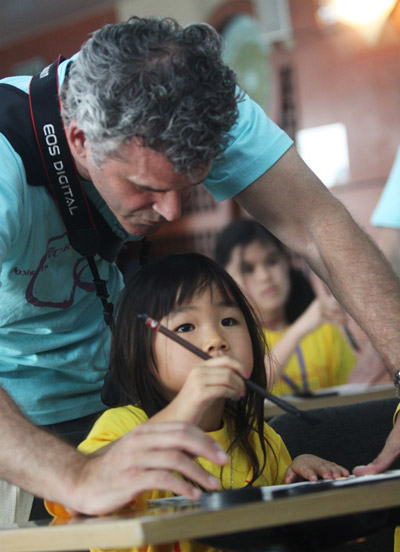Foreign parents taking more disabled orphans
 0 Comment(s)
0 Comment(s) Print
Print E-mail
China Daily, July 28, 2011
E-mail
China Daily, July 28, 2011
 |
|
Born in the Guangxi Zhuang autonomous region, 6-year-old Sascha Friend learns calligraphy in Beijing, July 27, 2011, with the help of her adoptive father, Russell Friend, who is from California. |
A growing number of Chinese orphans suffering disabilities or birth defects are finding homes with families overseas.
Official figures show more than 4,900 foreigners registered with the Ministry of Civil Affairs' adoption service in 2010, with roughly 3,400 in the United States.
"We helped about 580 Chinese orphans find families in the US in 2010, and more than 70 percent are physically or mentally challenged," said Joshua Zhong, president of the Colorado-based Chinese Children Adoption International.
Zhong, who arrived in Beijing on Wednesday as part of an annual heritage tour laid on by the ministry for 90 US families with adopted Chinese children, explained the trend is due to a decrease in the number of healthy children available for adoption and the introduction of favorable government policies.
It takes applicants in the US five years or even longer to adopt a healthy girl under 2 from China, he said. The adopting parents also need to be no older than 50 and have less than five children under the age of 18.
However, in 2005 rules for overseas applicants willing to take on a child with disabilities were relaxed. The age limit was raised to 55 and the restriction on offspring was lifted. Waiting times were also reduced.
Mary McKenny, from Atlanta, Georgia, said it took just 10 months to adopt her Chinese daughter Anna from a home in Chengdu, Sichuan province, in 2006. The girl, who is now 8, has undergone several operations to correct a cleft lip.
"We were cautious about adopting a disabled child at first because we didn't have any experience with children with special needs. We were worried we couldn't cope," said the 47-year-old mother during a welcoming ceremony for the US group at the Great Hall of the People on Wednesday.
"Since the day we got her, Anna has been a confident and outgoing child. She has brought tremendous joy to our family."
Li Jinju has helped run an orphanage in Luohe, Henan province, for two decades. Her care home has more than 200 children, about 98 percent of whom are disabled.
"About 20 children from our home were adopted by foreign families last year, one by a Malaysian couple and the rest by American citizens," she said. "In the past four years, all of our children who were adopted went to overseas families."
Li added that most Chinese families who visited gave up the idea of adopting a disabled child due to the high medical expense and intensive care involved.
Although there has been a rise in the proportion of adoptions involving disabled youngsters, statistics provided by the bureau of consular affairs under the US State Department show overall adoptions of Chinese orphans by US citizens has decreased since reaching a peak of 7,900 children in 2005.
"Both domestic and overseas adoption can help orphaned children return to families and enjoy parents' love," said Dou Yupei, deputy minister of civil affairs, at the welcoming ceremony organized by the China Center for Children's Welfare and Adoption.





